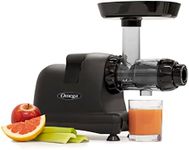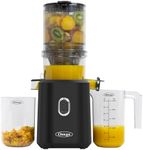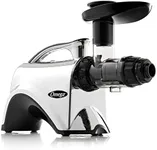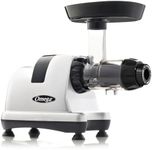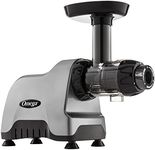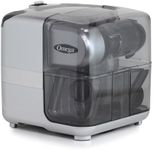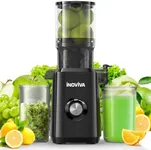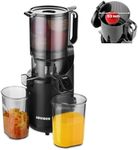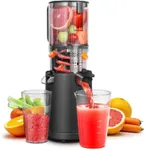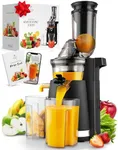Buying Guide for the Best Omega Juicers
When it comes to picking the right Omega juicer, it's important to consider your specific needs and preferences. Omega juicers are known for their quality and efficiency, but different models offer various features that can cater to different juicing habits. Understanding the key specifications will help you make an informed decision and ensure you get the best juicer for your lifestyle.Juicer TypeOmega offers different types of juicers, including masticating (slow) juicers and centrifugal (fast) juicers. Masticating juicers operate at a slower speed and use an auger to crush and press the produce, which helps retain more nutrients and enzymes. They are ideal for leafy greens, wheatgrass, and making nut butters. Centrifugal juicers, on the other hand, use a fast-spinning blade to extract juice quickly, making them suitable for hard fruits and vegetables. If you prioritize nutrient retention and versatility, a masticating juicer is a better choice. If you need speed and convenience, a centrifugal juicer might be more suitable.
Motor PowerThe motor power of a juicer determines its efficiency and ability to handle different types of produce. Motor power is usually measured in watts. Higher wattage means the juicer can handle tougher produce and operate more efficiently. For masticating juicers, a motor power of around 150-200 watts is sufficient, while centrifugal juicers may require 700-1000 watts. If you plan to juice hard vegetables like carrots or beets frequently, opt for a juicer with higher motor power. For softer fruits and leafy greens, lower motor power will suffice.
Juice YieldJuice yield refers to the amount of juice extracted from a given amount of produce. Higher juice yield means you get more juice and less waste. Masticating juicers generally have a higher juice yield compared to centrifugal juicers because they extract juice more thoroughly. If you want to maximize the amount of juice you get from your produce, look for a juicer with a high juice yield. This is especially important if you juice frequently or use expensive organic produce.
Ease of CleaningCleaning a juicer can be a time-consuming task, so it's important to consider how easy it is to clean the model you choose. Some juicers have fewer parts and are designed to be dishwasher safe, making them easier to clean. Masticating juicers typically have more parts than centrifugal juicers, but some models are designed with easy-clean features. If you have limited time or dislike cleaning, look for a juicer with fewer parts and dishwasher-safe components. This will make the juicing process more enjoyable and less of a chore.
Noise LevelThe noise level of a juicer can be an important factor, especially if you plan to use it early in the morning or late at night. Masticating juicers are generally quieter because they operate at a slower speed, while centrifugal juicers can be quite loud due to their high-speed operation. If you prefer a quieter juicing experience, a masticating juicer is the better option. If noise is not a concern for you, then a centrifugal juicer's noise level may be acceptable.
Size and StorageThe size and storage requirements of a juicer are important to consider, especially if you have limited counter or storage space. Masticating juicers tend to be larger and heavier, while centrifugal juicers are often more compact and lightweight. If you have limited space or plan to store the juicer away when not in use, a smaller, more compact model may be more suitable. If you have ample counter space and prefer to keep your juicer out for easy access, size may be less of a concern.

